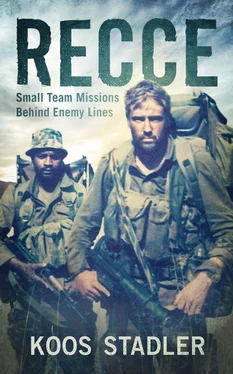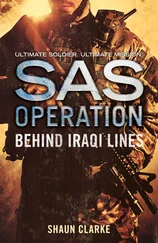My time at 51 Commando tested my personal mantra, developed so meticulously during my years at 31 Battalion, to breaking point. No longer could I say that this, and nowhere else, was where I wanted to be. But I endured because I believed it was a necessary stepping stone to get to Small Teams . I also knew that I was gaining invaluable information about the way SWAPO operated from men who had recently roamed the bush as PLAN cadres.
Another source of inspiration that made the time at Ondangwa worthwhile was the presence of Dave Drew, who was like a walking encyclopaedia and would share with me his intimate knowledge of SWAPO structures and tactics. Little did I know that Dave would soon be transferred back to 5 Recce and would serve as intelligence officer for the majority of Small Teams deployments I would be involved in over the next five years.
“Whenever a warrior decides to do something he must go all the way, but he must take responsibility for what he does. No matter what he does, he must first know why he is doing it, and then he must proceed with his actions without having doubts or remorse about them.”
– Carlos Castaneda,
Journey to Ixtlan
“Send men to spy out the land of Canaan, which I am giving to the people of Israel. From each tribe of their fathers you shall send a man, every one a chief among them.”
– Numbers 13:2,
The Bible (English Standard Version)
THE DAY I FINALLY drove through the gates at 5 Recce, my heart was thumping in my chest. Over the course of six months I had nagged Colonel James Hills so much to let me join the newly formed 54 Commando that eventually he had to concede. The persistent prompting by André “Diedies” Diedericks from 5 Recce also must have helped. I could hardly conceal my excitement, but at the same time I was anxious, mostly because I did not quite know what to expect.

Diedies welcomed me like a long-lost brother and the Small Team operators made me feel at home from the outset. The first thing that impressed me at the Small Team office block – and in fact the whole of 5 Recce – was the friendly and apparently relaxed atmosphere. There were no cowboys, no unfriendly stares, no holier-than-thou attitudes. Instead, seasoned operators came round to introduce themselves, which immediately made me feel part of the 5 Recce family. From the outset I also noticed the competitive tension between Small Teams and the two offensive commandos, but this was evidently the result of a healthy rivalry, and probably because Small Teams lured some of the best away from the commandos.
I was introduced to my team buddy, Sergeant “CC” Victorino, an exceptionally strong operator originally from Angola. Vic and his wife Christobel lived with their two kids in a house in Hebron, the village especially built for the married men of the unit. Vic took me in like a son, and his house became a regular stopover for a lonely bachelor.
The second thing that struck me was that Small Teams was clearly no Sunday-school picnic. There was a predominant air of urgency. The normal weekly routine was like an intense military course. We’d start the day with PT at 06:00. At 07:30 there was a quick roll call and order group. Every morning there would be lectures or group discussions. Portuguese lessons were a standard fixture of our morning routine. Since Portuguese was widely spoken in our theatres of operations the white operators had to gain a working knowledge of the language. With the aid of a “Learn-Portuguese-in-three-months” pocket guide, one of the Portuguese-speaking operators would guide us through the intricacies of the language, covering mostly pronunciation, vocabulary and some common phrases. During rehearsals before deployments we would concentrate on learning specific phrases to give us the edge in crisis situations – an advantage that would more than once in my Small Team career save the day, if not my life.
At the time, the majority of 5 Recce operators were black, about half of them were Portuguese-speaking soldiers originally from Angola and Mozambique. Most of the Angolan operators came from 32 Battalion, the highly acclaimed fighting unit established by Colonel Jan Breytenbach and made up of former FNLA fighters. The operators from Mozambique were recruited from Renamo, the Mozambican resistance movement, and were secretly brought to South Africa to be trained in special operations techniques. Given their experience in their home countries, these Portuguese-speaking operators were exceptionally suited for reconnaissance missions into those countries, and a select few were accepted into Small Teams. The rest of the operators were former Special Air Service (SAS) and Selous Scouts from Zimbabwe and a few were South African.
Signals lessons by Dave Scales, at the time a staff sergeant and the most senior NCO with Small Teams, would follow. Subjects such as antenna theory, electronic counter-measures (ECM), electronic counter-counter-measures (ECCM) and Morse practice were drilled into us. Dave had made the move to Phalaborwa with Diedies and acted as both the commando warrant officer and Tac HQ signaller. Having served with C Squadron, SAS and the Selous Scouts’ “Recce Troop”, Dave had extensive experience in small team operations. Aside from being exceptionally dedicated and highly professional, he had a sharp wit.
But Dave’s real claim to fame was signals. His knowledge of the subject was second to none. He came from a line of experts in the field of electronics in combat: his grandfather had been a signaller in the British Army during the First World War and used Morse code based on HF radio communications; his dad had been a signaller and paratrooper in the British Army in the Second World War and parachuted (among other significant feats) into the Netherlands on 17 September 1944 during the biggest parachute drop in history.
The signals lessons would alternate with sessions on Soviet-bloc weapons, aircraft and vehicles. Since all our target countries were supplied by the Soviet Union, or in some cases China, we focused all our efforts on the recognition of their military hardware. Along with the recognition of arms and equipment, a lot of time was spent on the analysis of Soviet-bloc doctrine as applied in the so-called frontline states.
After lunch, during the proverbial “graveyard session”, teams had time for kit preparation. Endless hours were spent preparing, altering, camouflaging and fine-tuning packs and webbing. Once the fierce lowveld temperature had subsided slightly, teams would depart for practical work; buddies could sort out their patrol formations and tactics, invent new anti-tracking methods and rehearse their team drills and standard operating procedures (SOPs). A lot of this practical training was spent on radio work and comms procedures.
At least two nights a week were set aside for night work. All the teams would report to the headquarters at 19:00, and then one of us would lecture on the theory of night operations, covering aspects like stalking, rendezvous (RV) drills or radio procedures in low-light conditions. Thereafter the teams would disperse into the training area for an exercise. More often than not we would sleep out in a hide after the night’s exercise and report for PT at 06:00. I did it because I loved being out in the bush, Vic probably because he did not want to disturb his family after the exercise ended around 02:00.
As Vic and I worked on our team skills, a relationship of mutual trust was established and a close bond developed between us. Vic was a big man, perhaps 20 kg heavier than me, and as fit as a fiddle, so I really suffered when we did buddy-PT together. While he could pick me up like a feather and run as if my weight didn’t bother him at all, I used to stagger under his weight.
Читать дальше













